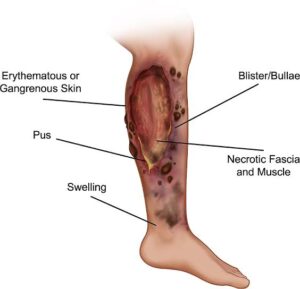Necrotizing Fasciitis And Nutritional Management
Necrotizing fasciitis (NF) also known as a flesh eating disease is a rare condition but life-threatening bacterial infection that affects the soft tissues, particularly the fascia, a layer of connective tissue surrounding muscles, nerves, and blood vessels. This condition requires prompt medical attention, also nutrition plays a crucial role in supporting recovery.
Necrotizing Fasciitis occurs when bacteria, typically Group A Streptococcus or polymicrobial infections, enter the body through an open and untreated wounds, surgery, or other traumatic events. The bacteria produce toxins that damage tissue and impair blood flow, leading to necrosis (tissue death). The infection spreads rapidly, causing severe inflammation, pain, and swelling. The symptoms associated with NF includes; severe pain disproportionate to the visible wound, swelling, redness, and warmth around the affected area, fever, blisters or skin discoloration etc.

Nutritional support is important in managing Necrotizing Fasciitis. The benefits of nutrition includes;
1. Supports wound healing: Adequate nutrition promotes collagen synthesis, tissue repair, and wound closure.
2. Maintains immune function: Optimal nutrient intake helps sustain immune response, combating infection.
3. Reduces morbidity and mortality: Nutritional support improves overall health, reducing complications.
Also, nutritional recommendation are,
1. Caloric intake: 25-30 kcal/kg/day is needed to support wound healing and immune function.
2. Protein: is essential to promote tissue repair and collagen synthesis.
3. Carbohydrates: Focus on complex carbohydrates, such as whole grains, fruits, and vegetables.
4. Fat: Emphasize omega-3 fatty acids, which support inflammation reduction.
5. Vitamins and minerals: Ensure adequate intake of vitamin C, zinc, and iron to support wound healing and immune function.
6. Hydration: Maintain adequate fluid intake to prevent dehydration.
7. Supplements: Consider adding arginine, glutamine, and omega-3 fatty acids to support wound healing.
Also read: Nutrition for different life stages: How your diet changes as You Age





Leave a Reply